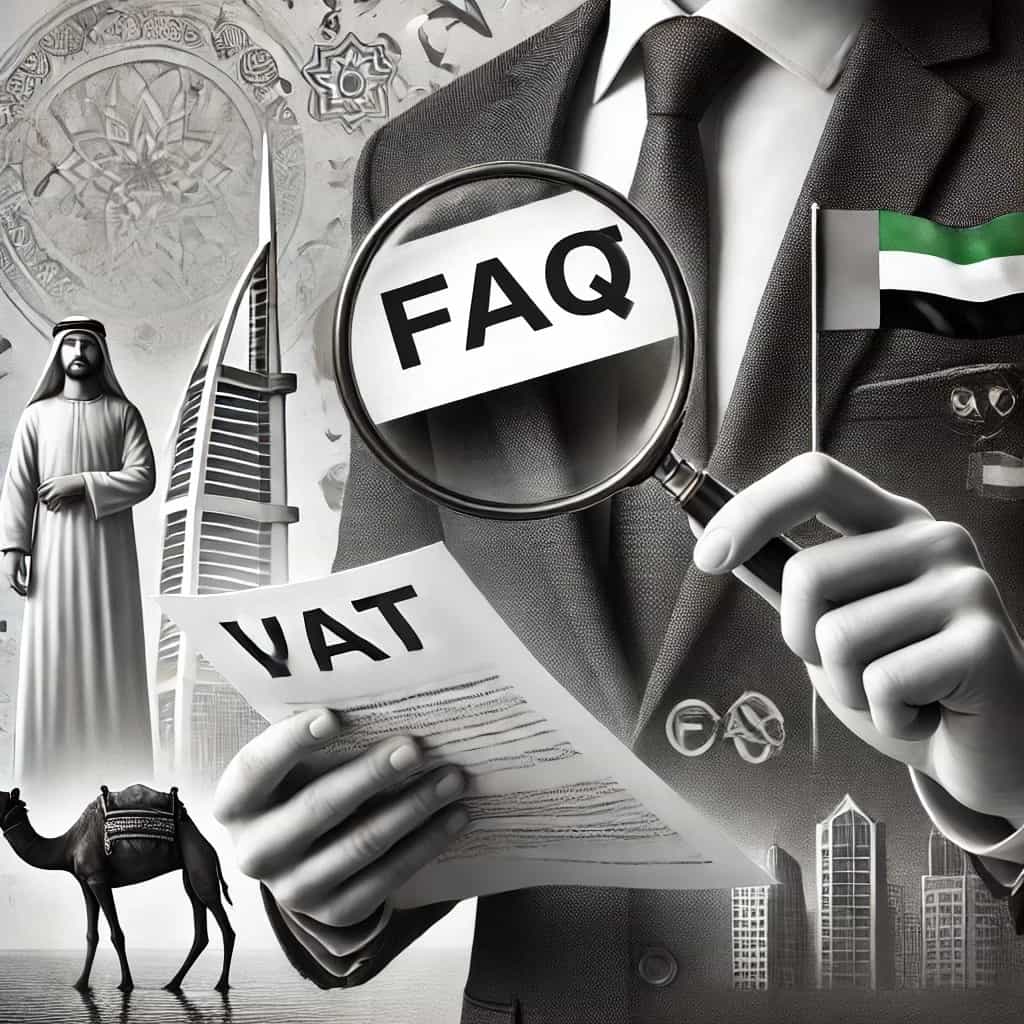UAE VAT FAQs: Your Top Questions Answered
Understanding the complexities of the UAE VAT system is crucial for businesses and individuals alike. This blog addresses the most frequently asked questions on UAE VAT, providing clear and concise answers to help you navigate the regulations with confidence. Whether you’re a business owner or a curious individual, our comprehensive FAQ guide on UAE VAT will keep you informed and compliant.
- What is VAT?
Value-Added Tax (VAT) is a type of indirect tax levied on sales of goods and services at each stage of production, distribution, or sale to the end consumer.
- Who needs to register for VAT in the UAE?
It is mandatory for businesses to register for VAT, when taxable supplies and imports exceed the threshold of AED 375,000 per annum.
Further, a business may voluntarily register for VAT only if their supplies and imports or avails taxable supplies exceeding AED 187,500 per annum up to AED 375,000 AED.
- How do I register for VAT in the UAE?
A business can register for VAT through Federal Tax Authority (FTA) e-services portal. A few documents such as trade license and other relevant information needs to be submitted.
If you are looking for a professional for obtaining VAT registration, then you can reach out to us at punith@bclglobiz.com
- When are VAT returns due?
VAT returns are to be submitted quarterly. The quarters will be calculated from the date of registration. The returns and payments due, if any, are to be paid within 28 days from the end of the quarter.
- What are the consequences of delayed VAT registration or filing?
Delayed registration or filing of returns attracts penalties. Penalty for late VAT registration is AED 10,000. On the other hand, for late filing of returns, penalty can range from AED 1,000 for the first time and AED 2,000 for subsequent offenses within 24 months.
- What are the types of VAT in UAE?
In UAE value-added tax (VAT) can be categorized into four major types:
- Standard Rated Supply: where VAT is levied at 5%. Majority of the transactions in UAE gets covered under this type.
- Zero Rated Supply: where VAT is levied at 0%. Applicable on exports, international transport, educational services etc.
- Exempt Supplies: Supplies not subject to VAT in UAE are exempt supplies. Transactions such as sale of bare land, local passenger transport, sale and lease of residential buildings are exempted from VAT.
- Out of Scope Supplies: Transactions which are outside the ambit of VAT legislature are considered as out of scope supplies.
- What is VAT-exempt in UAE?
Exempt supplies are basically not subject to VAT. As a result, business cannot reclaim VAT on their inputs.
- Who are exempted from VAT in UAE?
Certain transactions such as some specific financial services, bare land, local passenger transport, some specific supplies related to residential building are categorized as exempt supply under VAT law of UAE.
- What is Zero Rated supply under VAT in UAE?
A few supplies that are specifically charged at 0% in the VAT Law are listed under Article 45 of the Decree-Law.
- Which supplies are covered under Zero rated supply under VAT in UAE?
The list includes – Exports, international transport, investment in precious metals, sale of residential buildings (first supply within three years), supply of oil & gas, educational services as well as preventative and basic healthcare services and so on.
- What products are subject to VAT in the UAE?
In UAE, VAT is to be charged by a taxable person on all supply of goods and services made by him in the UAE at 5% except on those supplies which are listed under zero rated or exempt supplies as per the Decree-law.
Exports, international transport, educational services, crude oil & gas, educational services as well as preventative and basic healthcare services as categorized as zero-rated supplies. Supply of financial services specified in the executive regulation, bare land, local passenger transport, sale, and lease of residential buildings (which are not included in the zero-rated supply) are supplies which are exempted from VAT as per Decree-law.
- What is the VAT rate in UAE as of 2024?
Standard Rate of tax rate in UAE is 5%
VAT is to be charged by a taxable person on all supply of goods and services made by him in the UAE at 5% except on those supplies which are listed under zero rated or exempt supplies as per the Decree-law.
- What do you mean by VAT rate?
The VAT rate is the percentage at which a taxable person is required to collect tax from customers based on the sale value.
Tax amount (VAT) = Tax Rate (%) (normally 5%) multiplied by value of supply (monitory + nonmonetary)
- How is VAT calculated? Or How is VAT calculated in Dubai? Or How to calculate 5% VAT in UAE?
VAT is calculated on the value of supply made by the taxable person.
Tax amount (VAT) = Tax Rate (%) (normally 5%) multiplied by value of supply (monitory + non-monetary)
Example: Company XYZ, engaged in trading business in UAE mainland, sold one Mobile phone worth AED 5,000 to Mr. A at AED 3,500 after considering exchange of Mr. A’s old phone. Company XYZ must charge VAT at 5% on AED 5,000 i.e., 5,000*5%= AED 250.
- When to charge VAT?
The value-added tax (VAT) is required to be charged by the taxable person at the earliest of the following:
- The date on which the goods are transferred to customers / Date of completion of service.
- Date of receipt of payment against supply.
- Date on which tax invoice was issued.
- What is a VAT Bill/ VAT Invoice/ Tax invoice in UAE?
A Value-Added Tax (VAT) invoice/bill is a document issued by a taxable person. The VAT invoice is an important document providing the details of supplier and recipient, date of supply, description, value & quantity of supply, tax charges information and terms and conditions of supply.
- Can businesses reclaim VAT on their purchases?
Yes, businesses can reclaim VAT on purchases related to their taxable supplies, subject to certain conditions and documentation requirements. This also depends on the type of supply offered by the businesses. For an instance, business providing exempt supplies cannot reclaim VAT on their purchases.
- Are there any special VAT rates or rules for businesses in free zones?
Business established in free zone must comply with VAT laws and regulations. However, they may benefit from specific provisions depending on their activities, such as zero-rating on certain supplies.
- Is VAT refundable in UAE?
Taxpayer entities: When the input tax is greater than the output tax on a VAT return, the taxpayer can request a VAT refund after filing their VAT return.
Tourists and visitors: Tourists and visitors can claim refund on VAT paid on purchases they made during their stay in the UAE. Recovery of payment will be processed through a fully integrated electronic system which connects retailers registered in the ‘Tax Refund for Tourists Scheme’ with all ports of entry and exit from the UAE.
- What is a Tax Registration Number (TRN)?
A TRN is a unique identifier assigned to each VAT-registered business in the UAE. This should not be confused with the Corporate Tax registration number. Each registration allots a unique number for identifying and tracking the liabilities and refunds of the registered business. The TRN-VAT number contains 15 numbers, which has a format of 100-XXXX-XXXX-XXX3. The VAT TRN and Corporate Tax registration numbers are not interchangeable and must be strictly used for their specific purposes.
You may also refer to our detailed guide on the – Types of Tax Rates in UAE VAT
In conclusion, staying informed about UAE VAT is essential for ensuring compliance and avoiding penalties. Our UAE VAT FAQ guide has covered the key aspects and common questions, providing you with the knowledge needed to manage VAT effectively. For ongoing updates and further assistance, always consult with a tax professional or refer to our official VAT Compliance Services.
Also view the most affordable Accounting & Tax Compliance Packages in UAE for Businesses.








